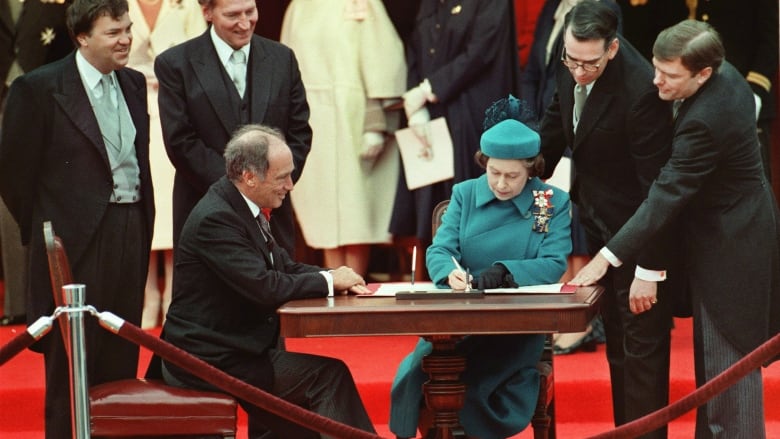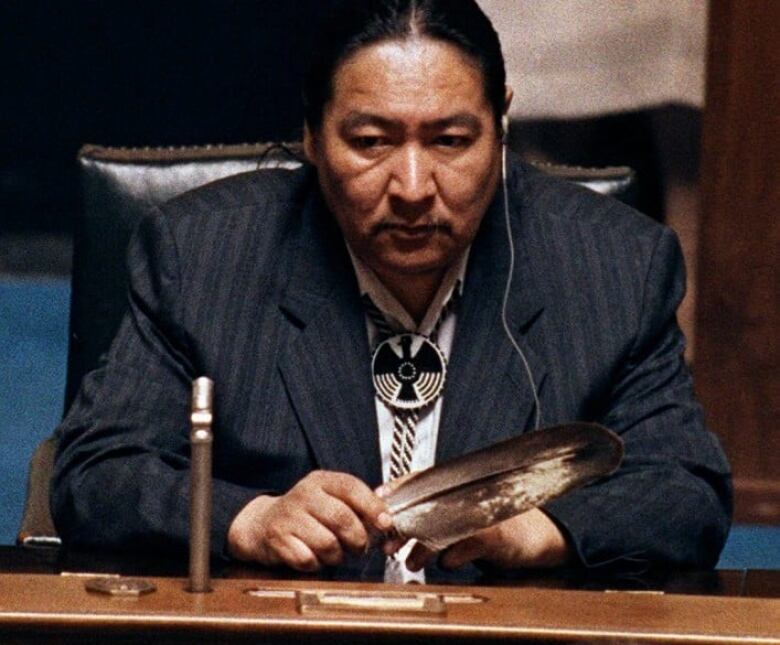Are there any politicians left in this country interested in building the nation?
At 40 years of age, Canada's Constitution remains essentially incomplete

This column is an opinionby Taylor C. Noakes, an independent journalist and public historian.For more information aboutCBC's Opinion section, please see theFAQ.
During the occupation of Ottawa, the organization Canadian Unity issued a memorandum of understanding requesting the Governor General dismiss the government and form a new one, drawn from the occupiers themselves. This prompted Mary Simon to remind Canadians she did not have the power to dismiss anyone, let alone register their votes of "no confidence."
It would be tempting to say this was an isolated incident, except for the fact that so many Canadians seem to genuinely not understand some fundamental aspects of our Constitution and system of government. As we approach the 40th anniversary of the signing of the Constitution Act this Sunday, let us reconsider the Constitution; how it came to be and where we might want it to go.
It's a poorly-appreciated aspect of the negotiations that brought us the Constitution and Charter of Rights and Freedoms that they were born out of the crisis of the 1980 Quebec Referendum. Pierre Trudeau committed himself to reforming federalism for all Canadians if the federalist side won the referendum. True to his word, six months after defeating Ren Lvesque he delivered a budget with a bold proposal to secure Canadian energy independence.
Though the National Energy Program was in keeping with the nation-building projects that had characterized federal governments since time immemorial, Trudeau's effort to give Canadians energy sovereignty by setting a goal of oil and gas self-sufficiency by 1990 unwittingly laid the foundation for challenges to federal authority and the very idea the federal government ought to be charting a course for the development of the nation.
How Canada's oil and gas resources were to be used, and who would direct their use, would ultimately prove to be a far more significant factor than Quebec sovereignty in determining the apparent limits of federal governance in Canada.
A quintessentially Canadian irony
Though the Constitution was supposed to chart a way forward from the impasses of the past, it has become an impasse in its own right, with the term "acrimonious constitutional negotiations" becoming part of the nation's political lexicon. It is a remarkable and quintessentially Canadian irony that the two efforts to secure Quebec's support for the Constitution would lead to the 1995 Quebec Referendum, a near disaster for federalism.
The shadow cast by the absence of Quebec's signature on the Constitution continues to loom over us, and a document intended to build the nation into a stronger and more unified whole remains essentially incomplete and the source of a growing internal dysfunction. It's a tragic irony too: our Charter of Rights and Freedoms is arguably the most emulated constitutional document in the entire world. For the most part, Canadians are immensely proud of their foundational documents, even if a lot of us don't completely understand what they mean or how they work.
A generalized constitutional illiteracy which was on full display during the occupation of Ottawa certainly isn't helping Canada be the vibrant, leading democracy it hopes to be, but in our case we also have to contend with politicians acting in their own narrow self-interest, and at odds with the Constitution and charter that's supposed to unite us together.

Franois Legault's controversial Bill 21, which bans public servants from wearing religious symbols at work, is a good example of politicians' testing the waters of constitutional violations. Unfortunately, federal party leaders withheld criticism of Legault's disregard for charter rights until well after the last election.
Other examples include Jason Kenney's campaign against equalization payments (Alberta doesn't pay any money to Quebec, irrespective of what the premier believes), and Doug Ford's use of the notwithstanding clause to enact a law limiting third-party election advertising that was already deemed unconstitutional.
The notwithstanding clause, which was once used so infrequently it was considered unnecessary, is now used to infringe on rights once considered sacrosanct.
Forty years after the signing of the Constitution Act, it feels like we're living in a peculiar political limbo. Despite the Quebec sovereignty movement's thorough defeat and Western alienation not (yet?) having evolved into a viable threat, we are nonetheless governed as though we are a loose confederacy of regions inhabited by people bearing deep animosities towardone another, where the mere proposal of greater cooperation is almost taken as a threat.
Indeed, actual agreements of cooperation between federal parties something which is constitutional and ought to be encouraged has recently been condemned by the Conservative Party of Canada.
Are there any politicians left in this country interested in building the nation?
A crucial moment in our history
One of the most significant moments in our four-decade-long constitutional saga lies inan often overlooked and crucial moment in Canadian history: the day Elijah Harper raised the eagle feather and filibustered the Meech Lake Accord, preventing its ratification by the Manitoba Legislature and ultimately resulting in the Accord's failure.
Though we could not understand the significance at the time, the summer of 1990 marked an important turning point in the nation's history, as Harper's principled opposition to a constitutional accord that all but ignored the Indigenous population was followed less than three weeks later by the beginning of the Mohawk resistance at Kanesatake.
Indigenous sovereignty and the innate right of Indigenous people and nations to self-determination would from that point forward grow to replace the issue of Quebec sovereignty as the dominant challenge to the constitutional status quo.
Centuries of injustices suffered by the Indigenous population has forced something of a national reckoning and resulted in a heretofore unseen level of solidarity from Canada's non-Indigenous population. If there is hope for the future of the nation, it may be found in a collective desire to right some horrific historical wrongs.
We still need to figure out what kind of country we'd like to live in, and whether we'll make a genuine effort to secure Indigenous input in the creation of a new and better Canada. Though the spectre of "acrimonious constitutional negotiations" still haunts us, the question we must ask is how much longer we're going to remain afraid of old ghosts.
Do you have a strong opinion that could add insight, illuminate an issue in the news, or change how people think about an issue? We want to hear from you. Here'show to pitch to us.












_(720p).jpg)


 OFFICIAL HD MUSIC VIDEO.jpg)
.jpg)



























































































